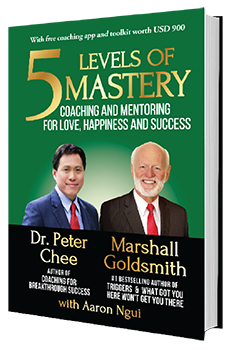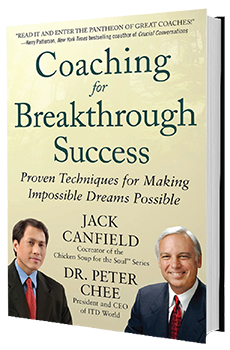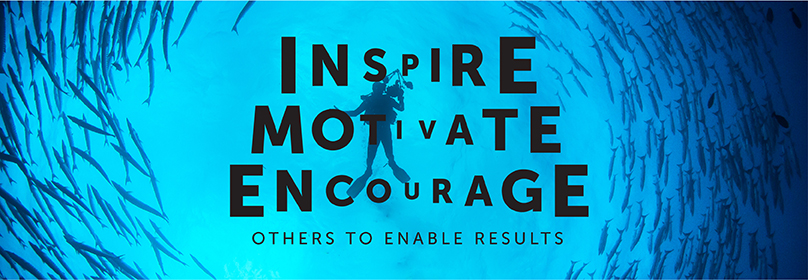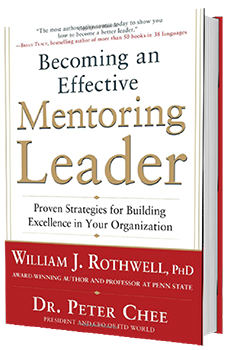
COACHING AND MENTORING
Organizations and corporations use coaching and mentoring to accelerate performance for sustainable success. The use of these two approaches to develop talent has grown tremendously as organizations and leaders seek ways to optimize talent.
Although people may use the terms interchangeably, the two approaches are different in their methods. Coaching empowers the coachee to establish their own goals and solutions. Mentoring meanwhile lets the mentee be systematically guided to enhance their competencies and capabilities.
Coaching and mentoring let decision makers maximize time in a VUCA (volatile, uncertain, complex, ambiguous) world. Leaders want high productivity while simultaneously engaging and developing their team to resolve issues. Coaching gives people a tremendous sense of ownership, accountability and commitment to empowers them. The process of drawing out solutions unleashes their potential to overcome challenges.
People experienced accelerated growth from being mentored by senior leaders or experts who share their wealth of experience, expertise and connections. Mentors also teach, advice, guide and support others on the journey for results.

In the book 5 Levels of Mastery by ITD World CEO Dr Peter Chee and Global Gurus’ First Corps d’Elite Member Dr Marshall Goldsmith writes that coaching empowers people.
The empowerment is generated as coaching unleashes human potential by allowing people to decide their own goals and to discover their own solutions. This gives them a strong sense of commitment to deliver results.
The authors firmly believe that people have vast potential waiting to be untapped. Unearthing this huge reservoir is done by asking powerful questions, encouragement and listening which makes people realize they are capable to do so much more.
“Even the best performers still have much potential to be tapped. So that is what we do as coaches, we bring out the best from people and let them lead.”
*Adapted from 5 Levels of Mastery by Dr Peter Chee, Marshall Goldsmith and Aaron Ngui.
5 Levels of Mastery: We are excited to begin a new and fulfilling journey together with you. It’s our intention to make this a journey of a lifetime. For a very important reason, we have created this book alongside complementary continuous learning solutions that serve as your compass, companion and coach throughout your life’s voyage for greater love, happiness and success. This work is also based on our extensive research and practice in coaching, mentoring, training and developing leaders from over eighty countries. In the process of helping people, we discovered what worked wonders to produce outstanding results.

//EXPLORE


Dr Peter Chee and Success Coach Jack Canfield outlined 30 essentials to be a great coach which they call The Coaching Principles (TCP):
Master the application of all 30 principles effectively with a copy of Coaching for Breakthrough Success to make impossible dreams possible.
Coaching for Breakthrough Success: Packed with stirring personal stories, life changing case studies, crucial coaching conversations, exemplary coaching questions, inspirational coaching quotes and ready-to-use tools that equip you to achieve professional mastery in coaching. This practical manual guides you through the top 30 principles every coach needs to succeed. You’ll learn the six paradigms of Situational Coaching, the ultimate power of Achievers Coaching Techniques, and the tried-and-true secret to making impossible dreams possible.

//EXPLORE
Coaching in Practice
The following video shows how a coaching session can potentially unfold in a separate setting.
This video is from the Heart of Coaching module of ITD World’s e-Learning. Get full access here or check the calendar for a time convenient to attend in person.


Mentoring happens when you teach or advise someone with the objective of enhancing the person’s capabilities or competencies. People want to learn from you because you are recognized for your expertise in what you do. In the book Becoming an Effective Mentoring Leader, Peter and Pennsylvania State University Professor William J. Rothwell writes that mentoring also includes inspiring, motivating and encouraging others. The mentor then is a role model for the mentee, the person who is under a mentorship of a mentor, to share knowledge, skills, experiences and connections for the growth of the person.
By sharing what and who you know to benefit others, you are multiplying the results and strengthening influence with people. Conversely, you can learn from the people you mentor to close your own gaps. By feeding off each other’s strengths, you can achieve so much more in work and life.


Peter and Marshall have established seven mentoring techniques for effective mentoring in their book the 5 Levels of Mastery. These are collectively known as the Power Mentoring Techniques (PMT) model. The seven are:

What lies behind us and what lies before us are tiny matters compared to what lies within us
Ralph Waldo Emerson

A masterful mentor uses all seven techniques to establish credibility, build trust, effect an effective knowledge and skills transfer process and connect the mentee with important contacts to grow the person being mentored. Building on these seven techniques is the “multisensory experience”. Peter and Marshall describe this as using the different senses for a memorable learning experience. Mentors can shake things up by having the mentoring session by the beach or at a café, and not just conduct the meeting in a formal setting.
Take a walk by the promenade to share an anecdote with a teachable point so the lesson sticks better in a more relaxed place. Alternatively, you can also organize a role-play to demonstrate a new skill and have your mentee repeat what you just showed. Be creative and innovative with your mentoring session and see how your mentee excels under your mentorship as you add more and more value.

One of the greatest values of men-tors is the ability to see ahead what others cannot see and to help them navigate a course to their destination.
Leadership Guru and ITD World Strategic Partner John C. Maxwell

5 Best Practices of Great Mentorse
A mentor is usually an expert or a very experienced person in a field of industry. Since mentoring is passing on knowledge and expertise to another person, effort would be made to ensure the mentor is matched with someone who wants to learn something about an area at work. It would be a waste of time if both match with someone who does not want to teach and who does not want to learn.
Building high trust relationships is about credibility and entails giving a lot of value to the person being mentored. A mentor can establish a deep connection by constantly given value through strong support and encouragement. Some mentors even volunteer their time to help their mentee in a difficult situation which goes beyond the expectation placed on them.
Great mentors challenge their mentees with stretch goals so they grow and develop throughout the process of meeting the targets. Mentors do so by challenging the mentee to meet the objective in a shorter span of time, give them suggestions on who they can approach to quickly build capability and advise their mentees when they are stuck.
Mentors are people who have already accomplished and recorded many successes in their life. Their list of accomplishments is a point of inspiration to the people they mentor. Not only that, their failures and how they overcame roadblocks and obstacles can be lessons for mentees as they navigate their own path to success.
Mentors not only guide, teach and advise, they also open doors of opportunity to mentees by introducing them to people who can help them climb the ladder. Great mentors constantly create opportunities for their mentees to learn from other experts by connecting them with people who are important for the mentees’ career and life.
For more on becoming a great mentor, pick up a copy of Becoming an Effective Mentoring Leader by Dr Peter Chee and Pennsylvania University Professor William J. Rothwell.
Power of Mentoring
In this video, ITD World senior consultant Edwin Godfrey Johnson shares his uplifting experience of being mentored by Peter.


ITD world has trained and developed thousands of leaders around the world since 1984. We have partnered with leadership experts, coaching gurus and mentoring giants to deliver cutting edge programs to take people to where they want to be. Our Certified Coaching and Mentoring Program (CCMP) brings the best in industry solutions in collaboration with four of our top Mega Gurus comprising Dr Peter Chee, Professor Wiliam J. Rothwell, Jack Canfield and world renowned consultant Thomas G. Crane.
This program empowers you to multiply your value to your organization, loved ones and the world through effective coaching and mentoring for sustainable results. The CCMP provides you with advanced coaching and mentoring techniques to use in synergy to coach and mentor your people throughout their life to obtain breakthrough results.
Check the calendar for a place and time which is suitable for you to attend. This program is recognized by the International Coaching Federation (ICF) and comes with 83 Approved Coach Specific Training Hours (ACSTH)*. If you are unable to attend the face-to-face sessions, you can learn online on ITD World’s e-Learning platform. The e-CCMP is accessible with an Internet connection.
Alternatively, chunk your learning down with the modular options comprising Essential Coaching Skills, The Heart of Coaching, Essential Mentoring Skills and Coaching for Breakthrough Success. Learn today to bring your life to the next level as coaching and mentoring is definitely a highly rewarding and fulfilling work for a lifetime.
*Terms and conditions apply
Becoming an Effective Mentoring Leader: Whether they need to boost productivity, increase profits, or both—executives are relying more heavily upon mentorship programs for employees in order to improve performance. As a management strategy, it’s a critical tool leaders can use to connect with the workforce, troubleshoot, and build teams. And leaders who mentor make more money, get promoted more quickly and enjoy greater career success than leaders who don’t mentor.

//EXPLORE